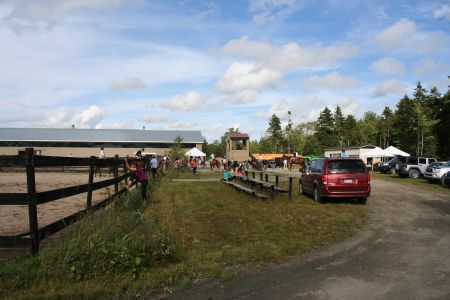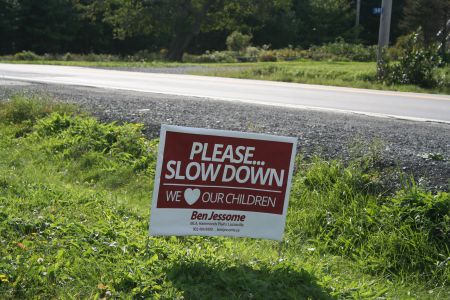KJIPUKTUK (HALIFAX) – Residents of Lucasville are telling city hall to do something about a smelly equestrian farm that for years operated without proper permits.
They are also fighting for the African Nova Scotian community's survival.
Lucasville, just minutes from Lower Sackville, is being squeezed out by mushrooming new subdivisions, increasing traffic volumes, and the threat of encroaching strip malls.
Soon the community with its rich black loyalist heritage will be just a memory, residents fear. They point to Beechville, another black community wiped off the map, as an example of what awaits them.
The immediate fight is about a farm.
Intense smells of horse manure emanating from Memento Farms prevent nearby residents from enjoying their back porches and forces them to keep their windows closed on even the most beautiful summer evenings, they say.
Almost daily, the smell is so bad he can’t go 30 feet out in his backyard,” Randy Wells told Public Information Meeting earlier this summer. But when he complained to authorities he was told he'd better move if he doesn't like it, he added.
Nearby residents also worry about rats, liquid manure run-offs after heavy rain, excessive dust, noise during equestrian events, and increased traffic.
The farm has been there for well over a decade. It's agricultural business was legitimate, but it was only recently discovered that a development agreement is required for its commercial recreational operations.
Many residents don't want the farm in their community, but they feel powerless and ignored by City bureaucrats and councilors.
The community wasn't consulted when the farm was built, 13 years ago, and a sign alerting the community to the recent development agreement process was hidden from view.
A city facilitator at a public meeting appeared so biased in favour of the farm that many in the audience simply assumed he was employed by the owner.
This is where the story becomes more than yet another story about neighbours who don't want a particular development in their backyards.
The farm is just a symptom of something much more serious, members of the Lucasville Community Association tell the Halifax Media Co-op.
Lucasville residents, much like the poorer residents of North End Halifax, are being squeezed out.
Much like their North End counterparts, they are mostly black. Much like North End residents, they feel marginalized, ignored and manipulated.
Large new and rather posh subdivisions have been sprouting up all around Lucasville for years now, without any consultation with the community.
Meanwhile, people in Lucasville pays the price. So much so, that especially young people don't really want to live there anymore.
“We want to know what's happening to the community. We asked to have buses so we can have more mobility. We asked to have sidewalks. I can barely walk down the road without risking my life,” says Deborah Emmerson, a member of the Lucasville Community Association.
“We're going to be another community that's just a statistic and a memory, “Like so many African Nova Scotian communities we will be wiped out because of big business development, the city making decisions and not consulting with the community.”
Lucasville being wiped off the map is not just a figure of speech.
Traditionally anything along the Lucasville Road, the road connecting Sackville Drive and the Hammonds Plains Road, was considered to be in Lucasville, says Iris Drummond, chair of the Lucasville Community Association.
But not anymore.
“The city people showed me a map, and Lucasville looked like a little reservation,” Drummond says.
“They changed big chunks to Hammonds Plains and to Middle Sackville because people don't want to be associated with a black community, I will just say it straight up.”
At one time, not that long ago, Lucasville was a flourishing community.
Like most of the African Nova Scotian communities formed in the early 1800s, it was allocated poor quality land that nobody else wanted. But the people of Lucasville worked it and toiled it for generations, and made a go of it.
“This has never been a poor community, it has always been a community with a very strong work ethic and a lot of pride,” Drummond explains. “Whether it was rock work, or cement work, or carpentry, domestics, nurses, teachers, this is a community of people who worked hard to be where they are today.”
But for how much longer, residents wonder.
“We understand, we need to be progressive, but it needs to be informed, and it needs to be in sync with the community's vision of maintaining and honoring its culture,” says Emmerson.
“It is intrinsic to the nature of city planners to take over, no matter what we say, if they think they can make a buck off tax dollars. The city has a way of pushing people out. Sometimes it is underhanded as in Africvile. Or sometimes they'll just come in bit by bit, and then say it's too late to change it now.”
“Given Halifax' shameful history with Africville, you'd think they'd be initiating engagement with the remaining African Nova Scotian communities. Wouldn't that be a great show of good faith.”
A petition to disallow the proposed development agreement between the city and Memento Farms will be read at the community council this Monday evening, September 21, at 6:30 at Acadia Hall in Lower Sackville.
Follow Robert Devet on Twitter @DevetRobert




